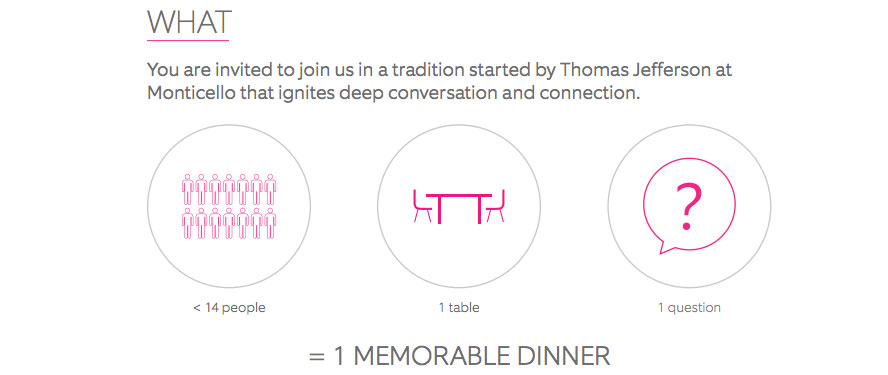What Jefferson can teach you about teamwork
Back in the 1800s, Thomas Jefferson turned the dinner party into something more than an opportunity for drinks and small talk. He started a tradition at his home in Monticello, inviting an intimate group of people to forge a discussion around a chosen topic. The only rule was that no more than 14 people attend, and the topic of conversation would be one that everyone would participate in.
The goal of this type of dinner was to build community and thank one of our customers, Possible, we recently discovered that Jeffersonian dinners aren’t just a thing of the past. In fact, organizations have used them to build authentic connections among like-minded individuals, to help drive awareness around causes, to shake up a typical dinner conversation, and to ultimately encourage teamwork not just among colleagues, but broader professional circles.
We see a wide range of commitments at our dinners — people have come forward interested in becoming a Board member, have offered us donated office space, and our Jeffersonian Dinners have been the nexus for sparking major partnerships between two companies that never knew of each other before.
A few weeks ago, Possible hosted a Jeffersonian Dinner at Asana and we got to experience first-hand what a ‘productive’ work dinner could look like. We welcomed global health industry leaders, marketers and content strategists, investors, and designers, to talk about a topic that’s quite universal: healthcare. Over the course of several hours, we all bonded in a way most of us probably never expected to. Our diverse group walked away with an intention to take what we learned and put it into action.
How to think outside the box at your next work dinner
You don’t have to host a Jeffersonian Dinner to make your next work dinner feel productive, but you can borrow a few ideas from this approach.

Broaden your company
We all know what it’s like to converse with like-minded people: you have similar backgrounds, work experiences, and professions, but bringing together a broader range of individuals to the discussion — be it members of an external team, or people who work in another industry — can help expand our horizons and open our minds to new ideas and possibilities.
Sit at one table
Depending on your event space, consider inviting only the number of individuals who can all sit at the same table (preferably round) and encourage having a centralized conversation.
Choose a focus
Dinners, like meetings, can sometimes be unproductive. Ahead of the dinner, reach out to attendees and either collectively decide on a focus of the dinner, or suggest you all come to the dinner prepared to talk about something specific. Formulating a question for the evening is a great place to start.
Don’t sell
If you’re trying too hard to pitch your dinner companions, you’ll lose sight of the greater goal of the gathering: to make deeper connections and gain an understanding for topics you may not be intimately familiar with. Walk into the dinner with an open mind, and no business cards (if you’re the event organizer, connect the individuals after your dinner).
Plan to walk away with a commitment
When you help people create memories with one another, they’re more likely to help each other as colleagues and friends.
At the end of our Jeffersonian Dinner with Possible, we went around the room and stated one to two clear commitments we planned to make after the meeting. Whether it’s to connect one of the dinner attendees with a like-minded colleague, to learn more about a specific topic, or to make a point of eating lunch with someone new every day, it’s important to walk away with a commitment.
At the end of the day, a Jeffersonian Dinner is simply a new (or old, depending on how you look at it) way to collaborate with a group of people you might not otherwise work with.
Have you ever been to or hosted a Jeffersonian Dinner? What advice do you have for others to have more productive work dinners?
Image courtesy of Possible.
More Issues
